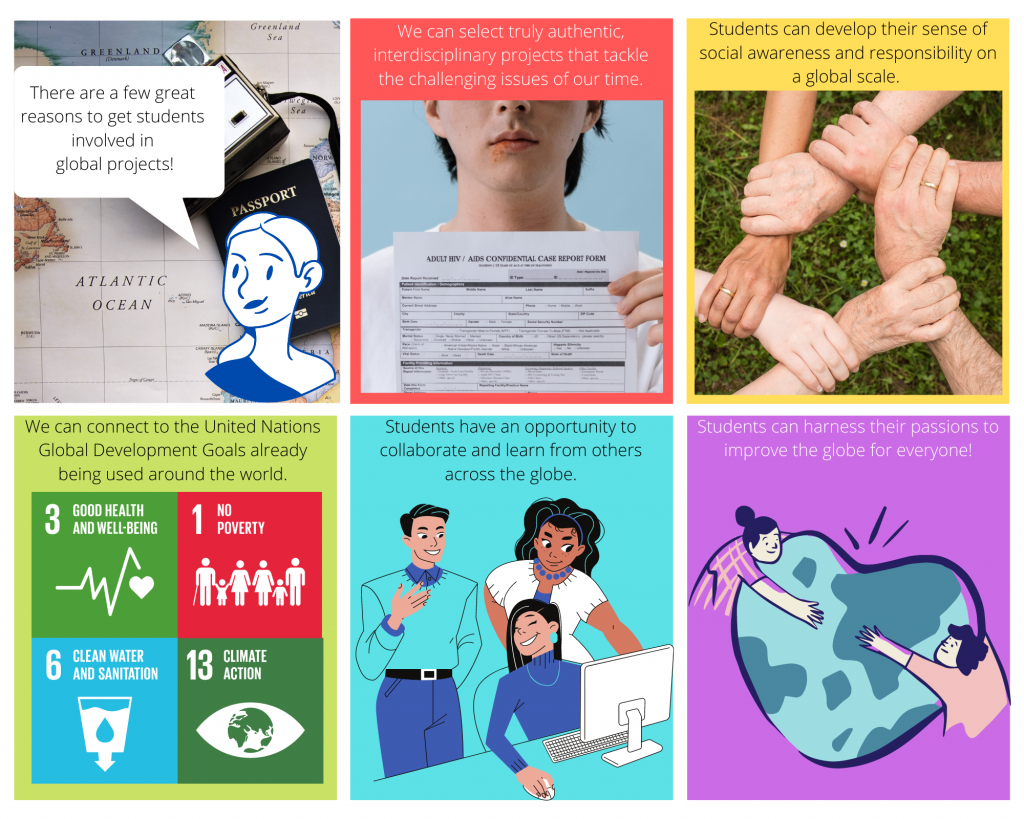
The Evaluating Tools slideshow assignment was not publicly published. It was a collaborative research assignment made with Queen’s University colleagues Dee Singh and Angela Stevens. We first surveyed our colleagues at BC schools about their app usage and compiled a list of the four most commonly used apps. We then created a Powerpoint presentation with the following information about each app:
- Purpose and educational value of the app
- Positives about the app, including FOIPPA compliance, if applicable
- Negatives and concerns about the app, including FOIPPA concerns
- Conclusion stating our recommendation about whether to use the app with students and caveats

Know
Global Projects: Creating this comic required use of image editing software like Canva, as well as understanding of basic visual readability/design skills. This comic sits at the modification stage, as it is more convenient to produce an image like this digitally, but it is very doable using traditional image composition tools/skills.
Evaluating Tools: This slideshow required online researching skills, basic Powerpoint knowledge, and online collaboration skills. This is augmentation-level to me purely due to the online collaboration that took place with colleagues from across the province. Without that collaboration piece, this would be modification – I could as easily have made a physical notebook.
Do
Global Projects: This comic demonstrates an understanding of how we can use online communities to build relationships across borders and make socially responsible contributions to the world through online collaboration. It aligns with the following ISTE standard:
- “3a: Create experiences for learners to make positive, socially responsible contributions and exhibit empathetic behavior online that build relationships and community.” (ISTE, n.d.)
Evaluating Tools: This research assignment models and promotes management of personal data and student privacy protection. It aligns with the following ISTE standards:
- “3b: Establish a learning culture that promotes curiosity and critical examination of online resources and fosters digital literacy and media fluency.” (ISTE, n.d.)
- “3d: Model and promote management of personal data and digital identity and protect student data privacy.” (ISTE, n.d.)
Understand
Global Projects: I have a strong interest in the Sustainable Development Goals as a tool for encouraging socially responsible and responsive learning, and I hope to use this lens of collaborative service learning, whether global or local, in my project-based learning moving forward. I believe strongly in the idea of working to solve authentic problems of the world in the classroom.
Evaluating Tools: I could see myself using something like this as both a professional development activity for staff and an inquiry into digital literacy for my students, using it to establish a learning culture that promotes digital literacy and media fluency. This is a powerful demonstration of just how much data different companies are collecting about us in our daily lives.
Sources
Hohner, J., Singh, D., & Stevens, A. (2021). Evaluating Tools [Powerpoint slideshow].
nternational Education and Resource Network. (2021). Getting Started. iEARN. https://iearn.org/about/about-getting-started.
International Society for Technology in Education. (n.d.). ISTE Standards for Educators. https://www.iste.org/standards/for-educators.
Project Everyone & UNICEF. (2021). The World’s Largest Lesson. https://worldslargestlesson.globalgoals.org/.
TakingITGlobal. (n.d.). Guide to Action: Simple Steps toward Change. http://tig.phpwebhosting.com/guidetoaction/Guide_to_Action_en.pdf.
TakingITGlobal. (2021). TakingITGlobal for Educators. https://www.tigweb.org/tiged/.